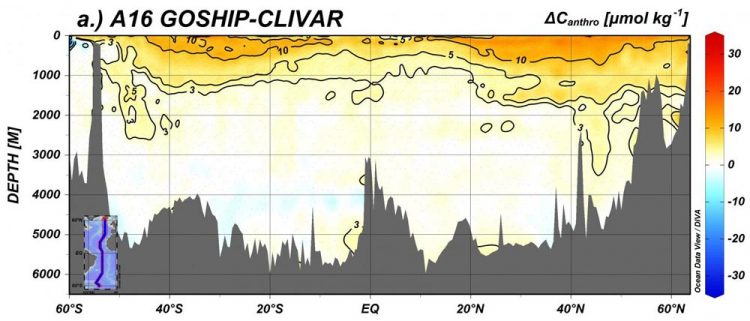Study shows North Atlantic Ocean CO2 storage doubled over last decade

Increases in anthropogenic CO2 in the Atlantic Ocean between 2003 and 2014. Credit: Ryan Woosley, UM Rosenstiel School of Marine and Atmospheric Science
A University of Miami (UM) Rosenstiel School of Marine and Atmospheric Science-led study shows that the North Atlantic absorbed 50 percent more man-made carbon dioxide over the last decade, compared to the previous decade. The findings show the impact that the burning of fossil fuels have had on the world's oceans in just 10 years.
To determine the total uptake and storage of carbon dioxide in the North Atlantic over the last several decades, researchers analyzed data collected from the same locations, but 10 years apart, to identify changes caused by man-made CO2.
The data were collected during two National Science Foundation-funded international ship-based studies, CLIVAR (Climate Variability CO2 Repeat Hydrography) and GO-SHIP (Global Ocean Ship-Based Hydrographic Investigations Program).
“This study shows the large impact all of us are having on the environment and that our use of fossil fuels isn't only causing the climate to change, but also affects the oceans by decreasing the pH,” said Ryan Woosley, a researcher in the UM Rosenstiel School, Department of Ocean Sciences.
The oceans help to slow the growth of human produced CO2 in the atmosphere by absorbing and storing about a quarter of the total carbon dioxide emissions. The North Atlantic is an area of high uptake and storage due to large-scale ocean circulations.
The uptake of CO2 has many impacts on ocean-dwelling organisms by decreasing the pH. The findings have important implications for marine organisms, such as corals and mollusks, which require a certain pH level in the surrounding water to build their calcium carbonate-based shells and exoskeletons.
The researchers hope to return in another 10 years to determine if the increase in carbon uptake continues, or if, as many fear, it will decrease as a result of slowing thermohaline circulation.
###
The study, titled “Rapid Anthropogenic Changes in CO2 and pH in the Atlantic Ocean: 2003-2014” was published in the journal Global Biogeochemical Cycles. The study's authors include: Woosley and Frank J. Millero of the UM Rosenstiel School; and Rik Wanninkhof of NOAA's Atlantic Oceanographic and Meteorological Laboratory. The study was funded by the National Science Foundation through grant #OCE0752972. The study can be accessed at http://onlinelibrary.
About the University of Miami's Rosenstiel School
The University of Miami is one of the largest private research institutions in the southeastern United States. The University's mission is to provide quality education, attract and retain outstanding students, support the faculty and their research, and build an endowment for University initiatives. Founded in the 1940's, the Rosenstiel School of Marine & Atmospheric Science has grown into one of the world's premier marine and atmospheric research institutions. Offering dynamic interdisciplinary academics, the Rosenstiel School is dedicated to helping communities to better understand the planet, participating in the establishment of environmental policies, and aiding in the improvement of society and quality of life. For more information, visit: http://www.
Media Contact
All latest news from the category: Earth Sciences
Earth Sciences (also referred to as Geosciences), which deals with basic issues surrounding our planet, plays a vital role in the area of energy and raw materials supply.
Earth Sciences comprises subjects such as geology, geography, geological informatics, paleontology, mineralogy, petrography, crystallography, geophysics, geodesy, glaciology, cartography, photogrammetry, meteorology and seismology, early-warning systems, earthquake research and polar research.
Newest articles

First-of-its-kind study uses remote sensing to monitor plastic debris in rivers and lakes
Remote sensing creates a cost-effective solution to monitoring plastic pollution. A first-of-its-kind study from researchers at the University of Minnesota Twin Cities shows how remote sensing can help monitor and…

Laser-based artificial neuron mimics nerve cell functions at lightning speed
With a processing speed a billion times faster than nature, chip-based laser neuron could help advance AI tasks such as pattern recognition and sequence prediction. Researchers have developed a laser-based…

Optimising the processing of plastic waste
Just one look in the yellow bin reveals a colourful jumble of different types of plastic. However, the purer and more uniform plastic waste is, the easier it is to…



